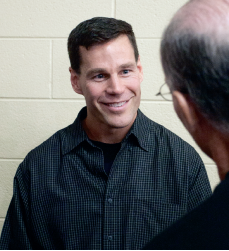Black Hawk Down Ranger: Jeff Struecker

THE REAL BLACK HAWK DOWN — Major Jeff Struecker was part of the Battle of Mogadishu, where the U.S. used black hawk helicopters to fight against the Somali militia. The battle was later depicted in a Hollywood movie in 2001.
The mission was set, every detail settled and the troops were sent out.
They were going to capture top ranking members of a violent warlord’s clan.
The first 30 minutes of the mission went as they should. Then PFC Todd Blackburn fell 70 feet from a Black Hawk helicopter, landing head first on the ground.
Blackburn had to be evacuated immediately and three vehicles from the convoy took Blackburn back to the base.
Minutes later a Black Hawk helicopter was shot down by a rocket propelled grenade. A Combat Search and Rescue squad fast roped to the crash site and rescued two injured crewmen.
Confusion between the ground and assault teams caused a 20 minute delay before they moved out. The convoy then made a wrong turn and got lost in the streets of Mogadishu, while Somali snipers and militia caused heavy casualties.
Another Black Hawk helicopter was shot down.
The assault team made it to the first crash site and was trapped for the night because of heavy militia fire.
Delta Force members SFC Randy Shughart and MSG Gary Gordon volunteered to aid the downed Black Hawk crew at the second crash site.
Meanwhile, the Lost Convoy abandoned its search for the first crash site and headed back for the base.
The helicopter at the second crash site was overrun by a mob. Shughart and Gordon were killed and the helicopter’s pilot was taken prisoner.
At approximately 2 a.m., a relief team of American, Pakistani and Malaysian United Nations forces arrived at the first crash site.
Four and a half hours later, the trapped soldiers were evacuated and the battle was over.
A group of Rangers and Delta Force operators had to run back to the base because of limited room in the convoy. Their trek has become known as the “Mogadishu Mile.”
In the end, 18 American soldiers were killed, 73 were injured and one was taken prisoner.
Oct. 3, 1993, has defined Major Jeff Struecker’s life ever since.
“I understand that God has given me a unique platform now as a result of Black Hawk Down,” Struecker said. “I get invited to events that I would not be invited to otherwise.”
As the sergeant in charge of returning Blackburn to the base, Struecker witnessed the first American casualty in Somalia and had to re-enter Mogadishu twice. Struecker helped to guide the Lost Convoy back to base and was a part of the 100-vehicle-long relief team that finally rescued the soldiers trapped at the first crash site.
“Largely, people want to hear about Black Hawk Down, so for the last 10 years I have I have been telling people about my experiences in Black Hawk Down,” Struecker said. “I am happy to do that because God, I am convinced, miraculously spared my life.”
Oct. 3, 1993, defined Struecker’s life, but Oct. 4, 1993, changed it.
“What I saw the next morning changed my life forever,” Struecker told students in convocation Friday. “I would still be a sergeant Army Ranger if it wasn’t for what I saw the morning after.”
Struecker described a critical moment during the battle to students during convocation.
While Struecker cleaned his comrade’s blood out of the back of his Humvee, he felt sure he was not going to make it through the day. To battle his growing fear, Struecker prayed.
Struecker said God gave him a peace and freedom from his fear.
“In either case, I (could) not lose, because of what my savior Jesus Christ has done for me,” Struecker said.
The day after the battle, Army Rangers and Delta Forcer operators with tear-streaked faces lined up around Struecker wanting to know what had made him different during the battle.
“It was that moment that God started to show me he had something different for me,” Struecker said.
Struecker then went to college and seminary to become an Army chaplain, while still being on active duty. Today, Struecker’s main responsibility is as a chaplain, but he still occasionally goes out on missions.
“I have never had a problem with a soldier being a Christian, going to war and potentially killing someone,” Struecker said. “I think it is perfectly morally justified. At least that is the way the Bible describes it. There are no issues with a soldier going to combat.”
Struecker said he believes it is still important to pray for his enemies, even if he is going into combat against them.
“A Christian has a responsibility to, out of love, pray for your enemies,” Struecker said. “I think you can pray for your enemies while still going to combat and while still fighting them. I have been praying for years that God would throw open the doors for his son Jesus Christ to be declared in Iraq and Afghanistan.”
Struecker does not believe the military is the tool to bring the Gospel to the nations of Iraq and Afghanistan, but he hopes the military’s actions can give the countries freedom to eventually become religiously diverse.
“I am convinced that when the gospel of Jesus Christ is preached among other faiths, that it will win out every time,” Struecker said.
“So it may not happen in my generation or in yours, but I am praying that millions of people in Iraq in Afghanistan come to faith in Christ, maybe on the shoulders of what our military is doing, not because of what our military is doing, but it will set the conditions so that there is religious freedom in those countries.”

Jeff, General Garrison is a personal customer if mine. Told him you will be at First Baptist in Dallas